|
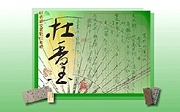 Du Xiang-guo (杜香國, 1893-1947) was a member of local gentry and industrialist in Dajia Town, Taichung County. His father, Du Qing (杜清, 1869-1937), was dedicated to improving quality of Dajia Straw hats and mats and exporting them to Europe and the United States. Being a successor of his father’s business, Du Xiang-guo was active in manufacturing and financial industry. The Du Xiang-guo Papers, with coverage date from 1908 to 1946, contains his correspondence on business matters, diaries during attending schools, and literacy works. Du Xiang-guo (杜香國, 1893-1947) was a member of local gentry and industrialist in Dajia Town, Taichung County. His father, Du Qing (杜清, 1869-1937), was dedicated to improving quality of Dajia Straw hats and mats and exporting them to Europe and the United States. Being a successor of his father’s business, Du Xiang-guo was active in manufacturing and financial industry. The Du Xiang-guo Papers, with coverage date from 1908 to 1946, contains his correspondence on business matters, diaries during attending schools, and literacy works.
Identification Description
Title
Du Xiang-guo Papers (杜香國文書)
Introduction
Du Xiang-guo (杜香國, 1893-1947) was a member of local gentry and industrialist in Dajia Town, Taichung County. The documents left behind him are acquired and preserved by the Institute of Taiwan History, Academia Sinica, and some of them are digitized for academic use.
Du Xiang-guo’s father, Du Qing, was a local businessman. He cooperated with other local businessmen to establish the HorThai company and the Dajia hats and mats trading association to improve the development of the industry. In addition, he used to serve as director of Dajia Credit Union and executive officer of Dadong Trust Corporation. Affected by his father, Du Xiang-guo began his business in economic and trade area, and served as manager of Taiwan Securities Co., Ltd, president of Dajia Chamber of commerce, general manager of Penglai Paper Co., Ltd., supervisory manager of Zhongnan Industrial Co., Ltd., and executive officer of Dajia Credit Union. Both the Du’s father and son were active in the business community in Taichung.
The Du Xiang-guo Papers contains more than 500 items, including his correspondence, photos, collected documents, and manuscripts which were created during the period of Japanese rule. More than reflecting intercourse between local families during the period of Japanese rule, those documents, including correspondence with his friends, diaries during schooldays, and manuscripts about his literacy works, help researcher understand cultural and educational situations and Du Xiang-guo’s contact with his friends. As for the correspondence on business matters and commercial information, revealing the situation of business development and civil disputes between businessmen, could be the first-hand material for the research into business development during that period.
Source of Collection
Producer: Du Xiang-guo
Coverage Dates
1908 - 1946
Biography
The Du Family had immigrated from Tongan Xian, Fujian Province, and moved to Dajia area over three generations. The Du Family had used to farm for living. Du Wu-sheng, Du Xiang-guo’s grandfather, became local celebrity with accumulation of land capital. Du Qing (1869-1937), Du Xiang-guo’s father, was famous for developing the Dajia hats-and-mats industry. He invited local capitalists to establish the HorThai company involved in improvement of hats and mats, and successfully expanded their overseas markets, boosting the rise of hat-and-mat manufacturing industry.
Du Xiang-guo (1893-1947), also known as Du Ci, with pen names Jiaxi, Jiaxi Master, Jiaxi Weihang, Du Xiang-gu and Jiaxi Du Xiang-gu, was born in Dajia Town of Taichung County. Graduated from the Dajia Elementary School and the Taiwan Governor-General’s National Language school, he used to teach in the Dajia Elementary School, then followed his father footsteps to become a businessman in 1913 and serve as manager of Taiwan Securities Co., Ltd, president of Dajia Chamber of commerce, general manager of Penglai Paper Co., Ltd., supervisory manager of Zhongnan Industrial Co., Ltd., and executive officer of Dajia Credit Alliance. He also succeeded his father as the administrator of the Jenn Lann Temple after his father passed away.
Du Xiang-guo cooperated with Chen Huang, Wang Zhui, Chen Xin, Huang Qing-bo, and Guo Wu-ji to organize the "Dajia New Society" in 1926, which was a peripheral organization of the Cultural Association. The Dajia branch of the Taiwan People's Party had been set up in 1927, and Du Xiang-guo was elected to be one committee member of the Branch. In the following year (1928), he was listed in the Economy Committee of the Taiwan People's Party and chosen to be the backbone.
As for literary activities, Du Xiang-guo used to be the vice-president of the “Poetry Daily ", but also to work with Zhuang Long, Xu Tian-kui, Wang Qing-shui, Chen Yong, Guo Cai-Feng, Chen Zao-fen, and Chen Jia-yu to found the "Heng Society" , which was the earliest poetry society in Dajia Town. His works had been published on several newspapers and magazines, including the "Taiwan Daily Newspaper", "Poetry Daily", and the "The South News".
Collection Details
Contents
The “Du Xiang-guo Papers” contains his correspondence with individuals, government agencies, and civil societies, as well as various forms of documents and manuscripts. The collection spanned from the Japanese colonial era to the early postwar period.
There are several kinds of correspondences in the collection, including correspondences with his family members, relatives in law, colleagues and friends, letters on business matters, as well as social activities. Those correspondences are not only with friends he met in the Taiwan Governor-General’s National Language School but also with his Japanese colleagues of Dajia Elementary School. Letters on business matters are correspondences with different agencies regarding Du’s investment, cash flow, relevant business negotiations, and civil disputes. Letters on social activities include the correspondences with Taiwanese as well as Japanese people and organizations, and the contents of them are all-inclusive, such as season’s greetings, weddings and funerals, invitations to parties and gatherings, trivial matters of daily life, discussion on thoughts or feeling’s sharing and so on. Moreover, there are Du’s correspondences with literary friends, who are literati with the same interest in literary creation as Du.
In addition to his correspondences, the “Du Xiang-guo Papers” also contains poetry works, personal manuscripts, and personal collection. In addition to Du’s personal works, his works for taking part in competitions with friends and gifts for friends are also included in the category of poetry works. In the category of personal manuscripts, there are Du’s diary and documents created during his schooldays in Taiwan Governor-General’s National Language School, drafts about his correspondences, and notes on random thoughts and business matters such as land trading. As for the personal collection, various types of documents, books, newspapers and photographs are included.
System of Arrangement
Being arranged in accordance with nature and subject of documents, there are seven series in the “Du Xiang-guo Papers”, including "Family and relatives-in-law", “colleagues and friends from schools", "business activities", "social activities", "cultural activities", "Personal manuscripts", and "Personal Collection" formed by 20 files, 556 items, with total number of more than 8,000 pages. Collections are listed below.
• DS00 Correspondence with Family and Relatives-in-law 家族姻親函件
o DS00_01 Correspondence with Family
o DS00_02 Correspondence with Relatives-in-law
• DS01 Correspondence with Colleagues and Friends 學校師友函件
o DS01_01 Correspondence with Friends from Taiwan Governor-General’s National Language School 臺灣總督府國語學校校友書信
o DS01_02 Correspondence with Colleagues from Dajia Elementary School 大甲公學校同 事書信
• DS02 Correspondence on Business Activities 實業界活動函件
o DS02_01 Correspondence with Taiwanese People 臺灣人士書信
o DS02_02 Correspondence with Japanese People 日本人士書信
o DS02_03 Correspondence with Taiwanese Agencies 臺灣機關書信
o DS02_04 Correspondence with Foreign Agencies 國外機關書信
o DS02_05 Copies of Correspondence on Business Negotiation 商業交涉底稿複寫
• DS03 Correspondence on Social Activities 社會活動函件
o DS03_01 Correspondence with Taiwanese People 臺灣人士書信
o DS03_02 Correspondence with Japanese People 日本人士書信
o DS03_03 Correspondence with Local Agencies 地方機關團體書信
• DS04 Literary Works and Correspondence with Literary Friends 藝文作品與函件
o DS04_01 Personal Literary Works 個人詩文作品
o DS04_02 Literary Works by Friends 文友詩文稿
o DS04_03 Correspondence with Literary Friends 文友往來書信
• DS05 Personal Manuscripts 手稿
o DS05_01 Diary and Documents Created During Schooldays in Taiwan Governor-General’s National Language school 臺灣總督府國語學校時期日記與文件
o DS05_02 Manuscripts and Notes
• DS06 Personal Collections 個人收藏
o DS06_01 Documents 文件
o DS06_02 Books, Newspapers, and Magazines 圖書報刊
o DS06_03 Photos 照片
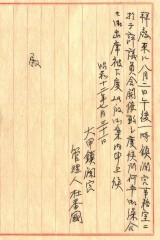
|
|
|
|
|
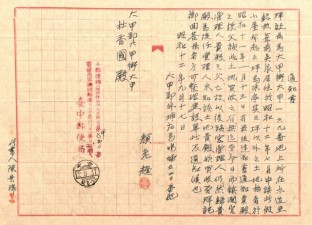
|
|
Meeting Notice of Dajia Jenn Lann Temple (鎮瀾宮) Council
In July 1937, Du Xiang-guo, as the administrator of the Temple, issued a notice stating the time and place of a council meeting.
|
|
|
|
|
Letter from Yan Lau-Suo to Du Xiang-guo
In September 1937, Yan Lau-Suo wrote to Du Xiang-guo, the administrator of Dajia Jenn Lann Temple, regarding land acquisition matters.
|
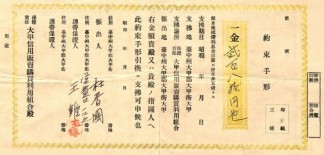
|
|
|
|
|
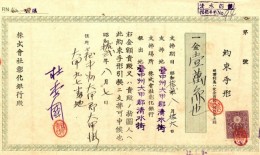
|
|
Promissory Note of Dajia Credit Union
The check Du Xiang-guo issued; Du’s friend Wang Zwei is the guarantor.
|
|
|
|
|
Promissory Note of Kabushiki Kaisha Chang Hwa Bank.
The check Du Xiang-guo issued in August 1937.
|
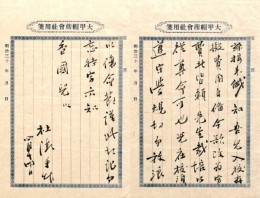
|
|
|
|
|
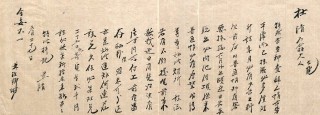
|
|
The Letter Du Qing Wrote to Du Ci (Du Xiang-guo)
In April 1908, Du Qing wrote to encourage his son Du Xiang-guo who was studying at Taipei National Language School.
|
|
|
|
|
The Letter Lin Huai-qing Wrote to Du Qing
In June 1913, Lin Huai-qing wrote to Du Qing about his trip to Kobe, Japan to conduct market research of women’s hats.
|
Administration Information
Acquisition Information
The Du Family’s residence was torn down in 1993, and documents left behind Du- Xiang-guo were purchased by several antiquities traders. The Institute of Taiwan History, Academia Sinica has been acquiring those documents in batches through purchasing and donation from 2003.
Access Information
The Institute of Taiwan History, Academia Sinica holds the rights of original documents and digital images. Please contact the Historical Records Reading Room of the Archives for use, or access digital images via Taiwan Archival Information System.
Text and images are provided by the Digitization & Value-added Project of Taiwan Historical Archives in the Archives of Institute of Taiwan History, Academia Sinica
|